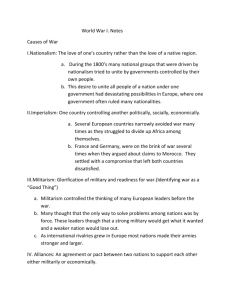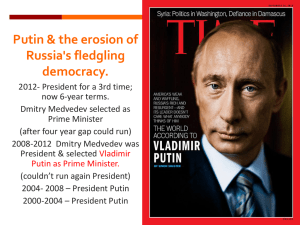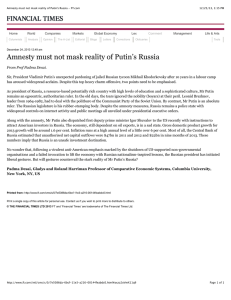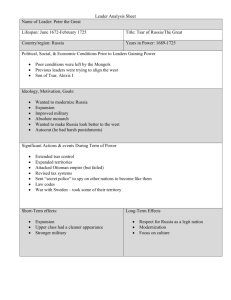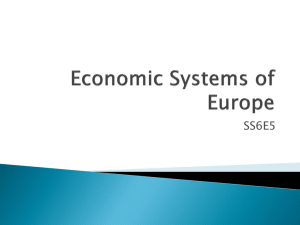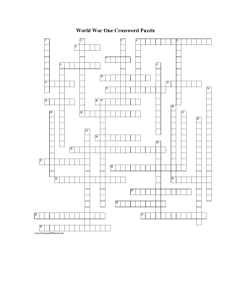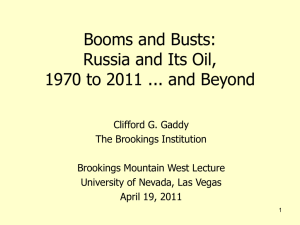The Economist, "Economic success has given China
advertisement
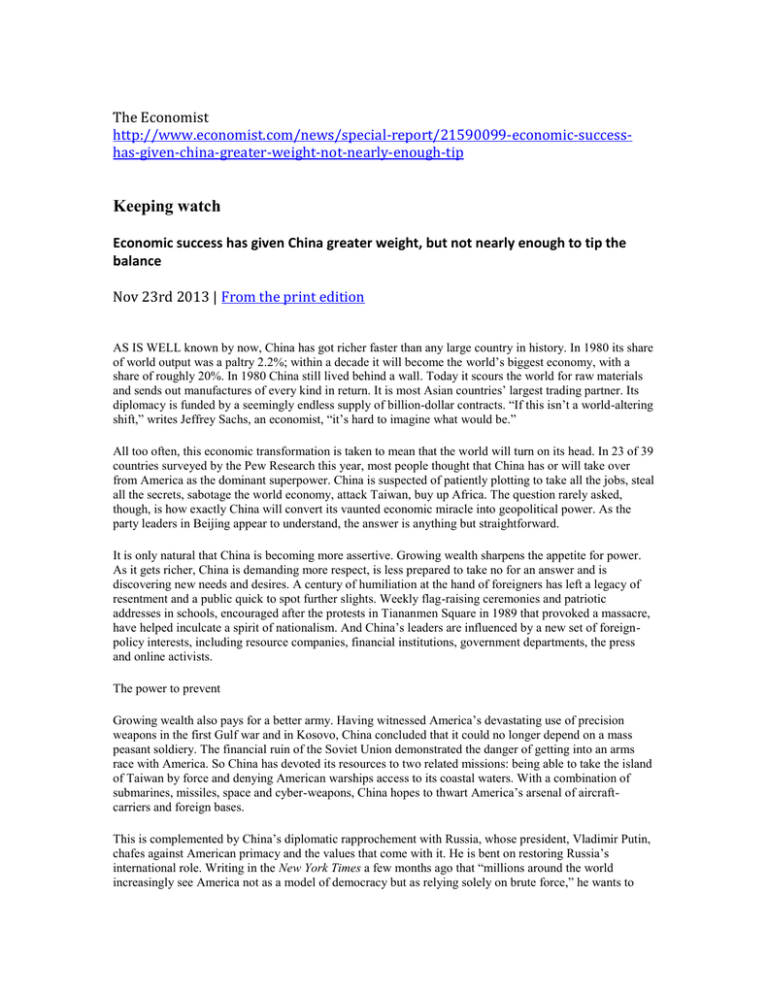
The Economist http://www.economist.com/news/special-report/21590099-economic-successhas-given-china-greater-weight-not-nearly-enough-tip Keeping watch Economic success has given China greater weight, but not nearly enough to tip the balance Nov 23rd 2013 | From the print edition AS IS WELL known by now, China has got richer faster than any large country in history. In 1980 its share of world output was a paltry 2.2%; within a decade it will become the world’s biggest economy, with a share of roughly 20%. In 1980 China still lived behind a wall. Today it scours the world for raw materials and sends out manufactures of every kind in return. It is most Asian countries’ largest trading partner. Its diplomacy is funded by a seemingly endless supply of billion-dollar contracts. “If this isn’t a world-altering shift,” writes Jeffrey Sachs, an economist, “it’s hard to imagine what would be.” All too often, this economic transformation is taken to mean that the world will turn on its head. In 23 of 39 countries surveyed by the Pew Research this year, most people thought that China has or will take over from America as the dominant superpower. China is suspected of patiently plotting to take all the jobs, steal all the secrets, sabotage the world economy, attack Taiwan, buy up Africa. The question rarely asked, though, is how exactly China will convert its vaunted economic miracle into geopolitical power. As the party leaders in Beijing appear to understand, the answer is anything but straightforward. It is only natural that China is becoming more assertive. Growing wealth sharpens the appetite for power. As it gets richer, China is demanding more respect, is less prepared to take no for an answer and is discovering new needs and desires. A century of humiliation at the hand of foreigners has left a legacy of resentment and a public quick to spot further slights. Weekly flag-raising ceremonies and patriotic addresses in schools, encouraged after the protests in Tiananmen Square in 1989 that provoked a massacre, have helped inculcate a spirit of nationalism. And China’s leaders are influenced by a new set of foreignpolicy interests, including resource companies, financial institutions, government departments, the press and online activists. The power to prevent Growing wealth also pays for a better army. Having witnessed America’s devastating use of precision weapons in the first Gulf war and in Kosovo, China concluded that it could no longer depend on a mass peasant soldiery. The financial ruin of the Soviet Union demonstrated the danger of getting into an arms race with America. So China has devoted its resources to two related missions: being able to take the island of Taiwan by force and denying American warships access to its coastal waters. With a combination of submarines, missiles, space and cyber-weapons, China hopes to thwart America’s arsenal of aircraftcarriers and foreign bases. This is complemented by China’s diplomatic rapprochement with Russia, whose president, Vladimir Putin, chafes against American primacy and the values that come with it. He is bent on restoring Russia’s international role. Writing in the New York Times a few months ago that “millions around the world increasingly see America not as a model of democracy but as relying solely on brute force,” he wants to curb American influence. When China and Russia stand together, they have blocking power in the UN— over removing the Syrian regime, for example, or imposing new sanctions on Iran. This hinders America’s ability to get things done, but it does not amount to a challenge to American primacy. To see why, look more closely at Chinese economic, military and diplomatic power. In each sphere its scope to break out of the American system is still limited and seems likely to remain so for many years. The geopolitical effects of a growing economy are a function not only of output but also of wealth. Were China’s economy the size of the America’s today, again measured by purchasing power, the average citizen would be roughly as rich as a Croat or Hungarian but less than half as rich as an American. China has more people, but America has a larger pool of technology and human and financial capital, all of which are geopolitically more potent than mere headcount. Moreover, China’s economy has thrived by being closely connected to the rest of the world. China could not challenge America without doing grave damage to the economic growth that is the Communist Party’s source of domestic legitimacy. If it tried to dump its holdings of around $1.3 trillion of US Treasury bonds, or somehow got Chinese companies to act in concert, it would not only lose on its investments but suffer from the resulting global recession, and its credibility as an investor and supplier would be destroyed. For an economy that has prospered through trade, that looks like a self-defeating strategy. Commerce itself is no guarantee of peace: a century ago Europe took to the trenches even though Britain was Germany’s largest export market. But China is in a weak position to sacrifice commerce for national glory. Not only would it lose its largest customers, but as Bruce Jones, an American academic, observes in a forthcoming book, its economy depends on oil imports flowing through the straits of Hormuz and Malacca. Both are under American control. Our interactive prediction tool lets you estimate when China’s GDP might eclipse America’s One answer would be for China to build a blue-water navy. But that, too, is a long way off. American military spending far outstrips anyone else’s. A large gap will remain even if China continues to increase its spending and America cuts back, as both certainly will. Concentrating on this year’s American budget ignores the stock of investment in recent years. More importantly, it ignores the American armed forces’ accumulated experience in battle. The initial assaults on Iraq and Afghanistan showed how American forces can combine with each other to devastating effect. If China went to war, it would be fielding systems and doctrines that have never been tested in live combat. It would also be risking a nuclear escalation. In Russia, China has a useful foil for frustrating America, but not for challenging it. The Russian economy does well when energy prices are rising, but they have already increased fivefold in the past 15 years and are unlikely to double and redouble again. In future Mr Putin is likely to be short of money. He is also plagued by Islamism in the Caucasus. Russia is a discontented and declining power—“like France pining for Napoleonic glory,” says Mr Russell Mead, “except bigger, uglier, meaner”. If China really wanted to challenge America, Russia would probably take fright. For now, they vote together in the UN Security Council and sign energy deals to develop eastern Siberia together. But, observes Fiona Hill of the Brookings Institution in Washington, there are limits to how far Mr Putin will make trouble at the UN. He does not want to drive diplomacy away from the Security Council, because that is the forum in which Russia holds most power. In addition, the Sino-Russian border is an abiding source of tension: heavily populated on the Chinese side, empty on the resource-rich Russian side. Mr Putin has already seen Central Asia drift towards China. He and his successors are bound to fear Chinese designs on Russia’s far east. Russia is by far China’s most useful ally. The others—Cambodia, Laos, North Korea and Pakistan—would not be much help in a challenge to America. America, by contrast, has a world-beating list of supporters. The chart at the start of this special report shows that America has about 60 of the 150 largest countries by population as its allies, as well as about 40 more that tend to lean towards it. Only 20 or so lean against. Add the military spending of America’s closest allies to its own, and China seems even further behind. Japan, South Korea and Australia are tied to America, and India is its partner. China cannot challenge America militarily without winning at least one of them over. China will find that hard. It went out of its way to cultivate Myanmar, pouring in money and people. But the Burmese found China’s embrace stifling. Myanmar’s leaders decided to open up to the West and pursue market and democratic reforms instead. They “wanted something better for their kids”, says Douglas Paal of the Carnegie Endowment for International Peace in Washington. It was the latest example of the allure of American primacy. China’s attempts to trade on its image as meritocratic and efficient compared with America and its money politics are not altogether convincing. The 50 richest members of Congress are worth a total of $1.6 billion, a trifle next to perhaps $95 billion for their counterparts in China’s National People’s Congress. Despite the prickly rhetoric in the columns of China’s nationalist Global Times, and regardless of the dire forecasts in Washington, China goes out of its way to keep relations with America steady. Mr Paal points out that after a recent history of sullen non-communication their armed forces and military intelligence have started to speak. The two countries successfully dealt with the case of a police chief from Chongqing who turned up in an American consulate and was handed back to the authorities; and that of a blind political activist who surfaced in Beijing and was allowed to emigrate to America. Belatedly, they have started to co-operate better over North Korea and, quietly, to explore what happens if it collapses. China’s challenge to America is not over global primacy. If it were, China would have a mountain to climb, militarily and diplomatically, and the world would have a good decade’s warning. Instead, China’s challenge is regional—over America’s ties to the countries that surround it, Taiwan and the territorial disputes in the South China Sea. And it is procedural—over how the system works and how much say China should enjoy. China is just the largest example of a more widespread problem for America. Other countries, such as India, Turkey, Brazil and Indonesia, are also acquiring a taste for power. They, too, seem to want to compete within the system rather than to overturn it. What if this makes American primacy unworkable?

